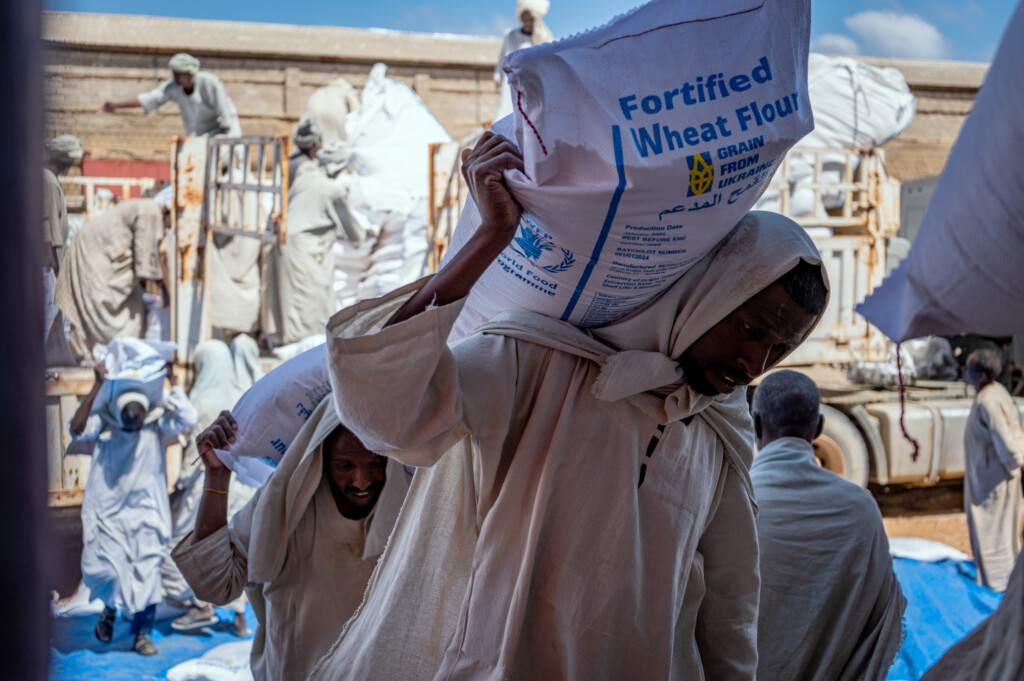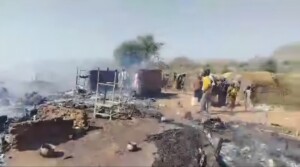Sudan govt to open borders and airports to humanitarian aid

Emergency food aid ofloaded in Port Sudan (File photo: WFP / Abubaker Garelnabei)
Following intense pressure from within Sudan and from the international community, the Sudanese government informed the United Nations today that it will open several border crossings from Chad, Egypt, and South Sudan, to allow the transport of “specified humanitarian aid”.
Prior to today’s announcement, the Sudanese government has obstructed delivery of aid, especially via Chad, citing concerns that the routes could be used for arms supply to the paramilitary Rapid Support Force (RSF). In the meantime, the humanitarian catastrophe is deepening by the day, leaving thousands of people teetering on the edge of survival.
In a statement seen by Radio Dabanga, the Sudanese government informed the United Nations today of its approval to use the El Tina crossing from Chad to in North Darfur to the state capital El Fasher, “to enter specified humanitarian aid, after agreeing on the technical aspects between the Sudanese and Chadian governments and in accordance with Security Council Resolution 1591*.
Supply routes from Port Sudan to El Fasher via Atbara will also be opened, as well as a route from Egypt via the Red Sea Road to Port Sudan and the Wadi Halfa-Dongola crossing. A route from South Sudan will be opened by river transport, and the land route from Renk to Kosti will also allow aid traffic.
The announcement also approves the use of the airports of El Fasher, as Kadugli (South Kordofan), and El Obeid (North Kordofan) “in the event of difficulty access via land roads”.
According to the Foreign Ministry’s statement, “the government renews its pledges and commitments to facilitate the access of humanitarian aid to those affected and in need throughout the country through ports, crossings and airports within national borders”.
Pressure
The announcement follows a chorus of appeals from withing Sudan and abroad.
In a statement to Radio Dabanga on Monday, WFP Sudan expresses deep concern about the humanitarian implications of the decision by the Sudan government to close cross-border operations from Chad into western Sudan.
“This will impede WFP’s plans to support around one million people in West and Central Darfur each month. Already more than 1.7 million people in the Darfur region are one step away from catastrophic hunger.” WFP laments: “Without assistance, families that are already teetering on the edge of survival will face deeper levels of hunger and malnutrition as needs continue to skyrocket across the region.”
The US Agency for Development says that the Director of the Agency, Samantha Power, had a call on Tuesday with the Commander-in-Chief of the Sudanese Armed Forces (SAF), and de facto President of Sudan, Lt Gen Abdelfattah El Burhan, about the deteriorating humanitarian situation.
Agency spokesperson Jessica Jennings said: “The call addressed the challenges facing the delivery of life-saving aid and the critical importance of protecting civilians.”
Power expressed deep concern about the decision of the Sudanese Armed Forces on February 22 to revoke cross-border humanitarian access into the Darfur region from Chad. She stressed the need to restore cross-border access from Chad, remove bureaucratic barriers, and ensure safe, sustainable, and unhindered humanitarian access for aid workers to urgently provide life-saving assistance.
The United Nations Coordinator for Humanitarian Affairs in Sudan, Clementi Salami, confirmed on Tuesday evening that the Sudanese authorities informed her of allowing relief to enter from Chad via Tina, and from South Sudan via Renk, as well as the airports of El Fasher, Kadugli, and El Obeid.
In late February, The US Dept of State urged the warring SAF and RSF “to immediately allow unhindered humanitarian assistance deliveries to all parts of Sudan”.
‘Crime against humanity’
International law expert Motasim Ali commented that denying the right to humanitarian aid to civilians is considered “a crime against humanity“ as more than one-third of the population of Sudan faces acute hunger.
Humanitarian organisations working in Sudan have been warning of an imminent risk of famine for millions of Sudanese due to continued violence and the subsequent failure of the agricultural season last year, Idris writes. The international community is struggling to provide the necessary financial resources to meet the humanitarian needs in Sudan.
Martin Griffiths, UN Under-Secretary-General for Humanitarian Affairs and Emergency Relief Coordinator, said on his account on X last week that “almost 5 million people in #Sudan face emergency levels of hunger, and as the conflict continues, things will only deteriorate. I’ve allocated US$15 million from @UNCERF to address this worsening food crisis.”
In a briefing to media in Geneva, Peter Graaff, acting representative of the World Health Organization (WHO) warned that displaced people sheltering in overcrowded areas lack access to water, sanitation, food, and the most basic services.
The Justice and Equality Movement (JEM) and the Sudan Liberation Rally announced their strict opposition to the Sudanese government not allowing humanitarian aid to enter through Chad.
The JEM says that “preventing the arrival of aid reflects abhorrent racism.” The JEM statement asserts that the government decision preventing the arrival of humanitarian aid to the Darfur regions through Chad, “comes at a time when the humanitarian and commercial convoys that were moving from Kosti to the Kordofan and Darfur regions stopped”.
The Sudan Liberation Forces Association called on the United Nations and the UN Security Council to pressure both sides of the war to stop the war and stop the massacres and violations against defenceless civilians immediately. It also appealed to humanitarian organisations to expedite the delivery of urgent relief and humanitarian aid to the displaced and those affected by the war in Darfur and Sudan.
* United Nations Security Council resolution 1591, adopted on 29 March 2005, after recalling resolutions 1547 (2004), 1556 (2004), 1564 (2004), 1574 (2004), 1585 (2005), 1588 (2005) and 1590 (2005) on the situation in Sudan, the council placed a travel ban and asset freeze on those “impeding the peace process” in Darfur. (Source: Wikipedia)











 and then
and then